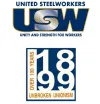This week in labor history: January 16-22

JANUARY 16
1920 – Thousands of Palmer Raids detainees win right to meet with lawyers and attorney representation at deportation hearings. “Palmer” was Alexander Mitchell Palmer, U.S. attorney general under Woodrow Wilson. Palmer believed Communism was “eating its way into the homes of the American workman,” and that Socialists were causing most of the country’s social problems.
JANUARY 17
1915 – Radical Labor organizer and anarchist Lucy Parsons leads hunger march in Chicago; IWW songwriter Ralph Chaplin wrote “Solidarity Forever” for the march.
1962 – President John F. Kennedy signs Executive Order 10988, guaranteeing federal workers the right to join unions and bargain collectively.
JANUARY 18
1909 – U.S. Supreme Court rules in Moyer v. Peabody that a governor and officers of a state National Guard may imprison anyone — in the case at hand, striking miners in Colorado — without probable cause “in a time of insurrection” and deny the person the right of appeal.
1978 – “Take This Job and Shove It,” by Johnny Paycheck, is listed by Billboard magazine as the most popular song in the U.S.
JANUARY 19
1915 – Twenty strikers at the American Agricultural Chemical Co. in Roosevelt, N.J., were shot, two fatally, by factory guards. They and other strikers had stopped an incoming train in search of scabs when the guards opened fire.
1920 – Some 3,000 members of the Filipino Federation of Labor strike the plantations of Oahu, Hawaii. Their ranks swell to 8,300 as they are joined by members of the Japanese Federation of Labor.
1973 – Yuba City, Calif., labor contractor Juan V. Corona found guilty of murdering 25 itinerant farm workers he employed during 1970 and 1971.
1986 – Bruce Springsteen makes an unannounced appearance at a benefit for laid-off 3M workers, Asbury Park, N.J.
JANUARY 20
1909 – Chicago Crib Disaster — A fire breaks out during construction of a water tunnel for the city of Chicago, burning the wooden dormitory housing the tunnel workers. While 46 survive the fire by jumping into the frigid lake and climbing onto ice floes, approximately 60 men die, 29 burned beyond recognition and the others drowned.
1961 – Hardworking Mickey Mantle signs a new contract with the New York Yankees making him the highest-paid player in baseball: $75,000 for the entire 1961 season. It should be noted that because there were no long-term contracts, salaries fluctuated every year. In 1947, for example, Hank Greenberg signed a contract for a record $85,000. The Major League Baseball Players Association was created in 1953 and in 1968 negotiated the first collective bargaining agreement (CBA) with team owners, raising the minimum salary from $6,000 to $10,000 per year.
1986 – Bruce Springsteen’s “My Hometown,” a eulogy for dying industrial cities, is the country’s most listened-to song. The lyrics, in part: “Now Main Street’s whitewashed windows and vacant stores / Seems like there ain’t nobody wants to come down here no more / They’re closing down the textile mill across the railroad tracks / Foreman says these jobs are going boys and they ain’t coming back to your hometown…”
JANUARY 21
1946 – Some 750,000 steel workers walk out in 30 states, largest strike in U.S. history to that time.
1974 – Postal workers begin four-day strike at the Jersey City, N.J., bulk and foreign mail center, protesting an involuntary shift change. The wildcat was led by a group of young workers who identified themselves as “The Outlaws.”
2000 – Six hundred police attack picketing longshoremen in Charleston, S.C.
JANUARY 22
1826 – Indian field hands at San Juan Capistrano mission refuse to work, engaging in what was probably the first farm worker strike in California.
1849 – Birth of Terence V. Powderly, leader of the Knights of Labor.
1890 – The United Mine Workers of America is founded in Columbus, Ohio, with the merger of the Knights of Labor Trade Assembly No. 135 and the National Progressive Miners Union.
(Compiled by David Prosten, founder of Union Communication Services)
- TAGS
- labor history
